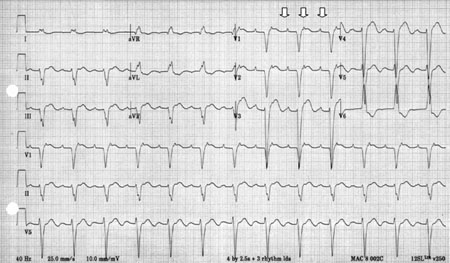Case history
Case history #1
An 88-year-old woman with history of dilated cardiomyopathy presents with nausea, lightheadedness, and a racing heart. She is taking digoxin and recently her diuretic dosage has been increased. On exam she is alert but weak. Her BP is 108/88 mmHg, and pulse 88 bpm and regular. The lungs are clear. An ECG shows a sustained atrial tachycardia at 180 bpm with 2:1 AV block. Serum potassium is 2.8 mEq/L.[Figure caption and citation for the preceding image starts]: Focal atrial tachycardia in an 88-year-old woman with 2:1 AV nodal block in the setting of digoxin therapy and potassium 2.8 mEq/LFrom the collection of Sarah Stahmer, MD [Citation ends].
Case history #2
A previously healthy 35-year-old man presents following intoxication from alcohol and cocaine. He is feeling weak and shaky with reduced exercise tolerance. His BP is 110/70 mmHg and heart rate 160 bpm and regular. An ECG shows a narrow complex atrial tachycardia. He is given adenosine 6 mg intravenously. There is abrupt slowing of the ventricular response rate with no effect on the atrial rate.[Figure caption and citation for the preceding image starts]: Focal atrial tachycardia in a 35-year-old with history of recent cocaine useFrom the collection of Sarah Stahmer, MD [Citation ends]. [Figure caption and citation for the preceding image starts]: ECG following cardioversion of focal atrial tachycardia in a 35-year-old with history of recent cocaine useFrom the collection of Sarah Stahmer, MD [Citation ends].
[Figure caption and citation for the preceding image starts]: ECG following cardioversion of focal atrial tachycardia in a 35-year-old with history of recent cocaine useFrom the collection of Sarah Stahmer, MD [Citation ends].
Other presentations
Presentations of focal atrial tachycardia are highly variable, ranging from nonspecific complaints of fatigue and light headedness to congestive heart failure and syncope. Brief episodes of tachycardia may elicit complaints of chest fluttering or palpitations. Sustained runs of tachycardia will probably have more marked presentations, such as ischemia in patients with underlying coronary artery disease, and congestive heart failure and syncope in patients with preexisting cardiomyopathy. Sustained atrial tachycardias can also precipitate cardiomyopathy, particularly in children.
Use of this content is subject to our disclaimer